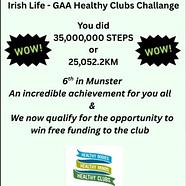At a recent coaching course, the theme for discussion involved the relationship between young children and the development of movement. The course was led by former National Director of Hurling, Paudie Butler, and one of his key messages or take-home points from the evening was that “movement is a child’s first language.”If you reflect back on your own childhood, it is very unlikely that you, as an infant, spoke before you began you to move. As children grow they become more competent at moving. This is achieved by the acquisition of “physical literacy,” which is the development of fundamental movement skills (FMS) that permit a child to move with confidence and control in a wide range of physical activities.
INTRO TO FUNDAMENTAL MOVEMENT SKILLS
Fundamental movement skills are often described as the “building blocks” that precede specialized movement patterns, which are required in the majority of sporting and leisure activities, including Gaelic games. Children naturally develop rudimentary (basic) movement patterns during childhood; however proficiency of FMS is only likely to be achieved through refinement (repetition by means of practice). Fundamental movement skills may include locomotor (running and jumping); manipulative or object control (catching and throwing); and body control (balance and co-ordination). The mastery of FMS contributes towards children’s development and is thought to provide the foundation for lifelong physical activity. Physical activity guidelines recommend that the development of FMS should be central to any early childhood education programme.
BENEFITS OF FMS
Research has suggested that there is a strong relationship between FMS competence, and the health of children and teenagers. Several benefits have been established in terms of physiological, psychological and behavioural outcomes.
Increased cardiovascular fitness, muscular endurance and flexibility/mobility are primary examples of these physiological outcomes. Reduced adiposity (fat mass) is also linked with FMS proficiency. Higher perceived physical competence is the main psychological outcome for children with proficient fundamental movement skills; others include increased self-esteem and reduced anxiety while physically active. Increased sports participation, and maintenance of physical activity throughout adolescence and adulthood are the principle behavioural outcomes for children with mature fundamental movement skills. Reduced sedentary behaviour is a further behavioural benefit, which is associated with the aforementioned positive physiological outcomes.
IMPLICATIONS OF POOR FMS
Unfortunately there are a multitude of disadvantages for those who lack competency in fundamental movement skills. Failure to learn these skills during childhood may impede sporting participation later on in life. This may prevent individuals from adhering to daily physical activity guidelines that are prerequisite for health maintenance. The development of obesity is heavily linked with sedentary behaviour caused by physical inactivity during childhood. Furthermore those who lack fundamental movement competency are likely to experience frustration and difficulty when learning more advanced sport-specific skills. For example, competence in the basic underhand throw is necessary in order to develop the motor programme required for the hand pass (hurling/camogie) or fist pass (football). Therefore if a child is unable to perform a basic task (underhand throw) in a controlled manner, it reduces the likelihood of the child being able to execute a more complex skill (hand/fist pass). The fear of "public failure" or ridicule from peers may further discourage children from participating in organised sport, ultimately leading to dropout. Research indicates that 80% of Irish children have underdeveloped FMS – this is a very alarming statistic but thankfully primary school children in Shannon “buck the trend …”
FMS IN PRIMARY SCHOOL
The Irish Primary School P.E. Curriculum acknowledges the importance of acquiring an appropriate range of fundamental movement skills in a variety of contexts. Games Development Administrators (GDAs) employed by the GAA are tasked with implementing a physical education programme, through the medium of Gaelic games. Our children are very privileged to have access to GDAs who understand the importance of coaching these skills in schools throughout our county. GDAs are often assisted by club coaching officers.
The GAA created a progressive model, in accordance with the P.E. curriculum, which incorporates fundamental movement skills. This developmental model has three levels – (1) ABC = Agility-Balance-Coordination; (2) RJT = Running-Jumping-Throwing; (3) CPK/S = Catching-Passing-Kicking/Striking. If a child is to advance onto the next level of this model; competency must be achieved in the previous level e.g. children require proficient agility, balance and coordination in order to establish competent running, jumping and throwing techniques. When the RJT techniques have become proficient; the learning process is repeated once more and the child is now ready to develop their catching, passing and kicking/striking skills.
This model can be illustrated by the following metaphor – picture a newly built house in your head, whereby the house represents a child GAA player. The foundation (ABC) of the house supports the walls (RJT), which act as a support for the roof (CPK/S) that provides a safe environment for those inside (GAA Player) – the house (child) can only function if the preceding support is in place, otherwise it will collapse and fail.
IMPLICATIONS FOR COACHES
Evidence would suggest that coaching fundamental movement skills is crucial for the growth of healthy children, especially for those who wish to play and excel in Gaelic games. For example the majority of schools, that win “Cumann na mBunscoil” finals in Cusack Park, are being coached FMS by their regional GDA or club/school coach. The coaching of FMS may lead to children gaining some of the following skills - improved hand-eye, hand-foot, or foot-eye coordination; increased speed and acceleration capacity; enhanced body control and proprioception; increased bone density and limb musculature; and development of accurate foot control and placement.
The P.E. Curriculum in Irish Primary Schools emphasises that the development of FMS can be facilitated best by (a) demonstration by the teacher or by a child, (b) allocation of opportunities for exploration and practice by children, (c) generation of positive feedback by the teacher based on observation and (d) assessment of learning by children in the form of peer feedback – GAA club coaches could adopt a similar protocol. Therefore, it is advisable that clubs incorporate fundamental movement into their nursery and underage programmes. However this process is one that shouldn’t be hurried as children mature at different rates, which may lead to developmental delays – patience is prerequisite during this time because as we all know … “Rome wasn’t built in a day …”







